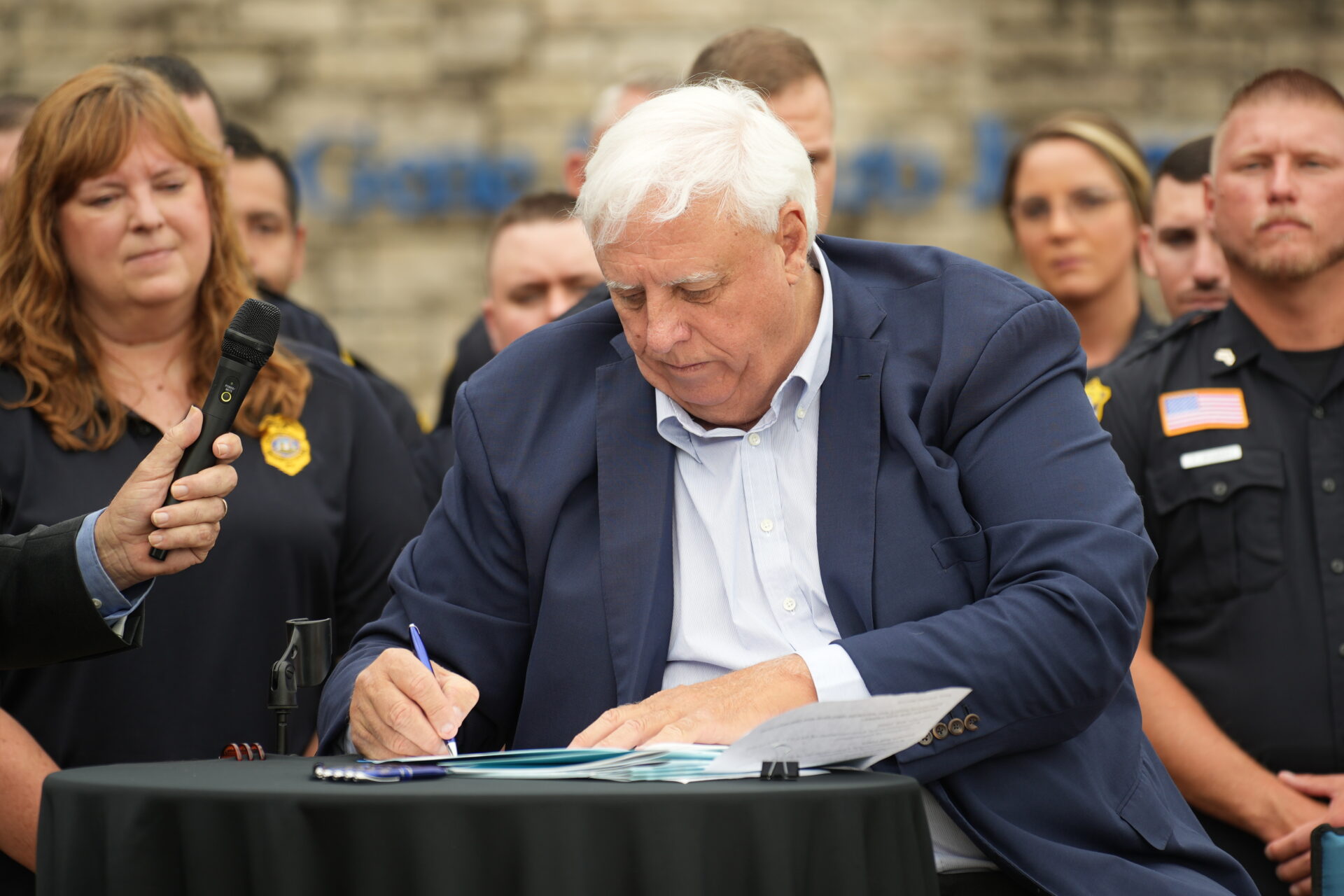Speaking at the Gene Spadaro Juvenile Center in Mt. Hope, Gov. Jim Justice said the state should have responded to corrections officer vacancies and facility maintenance needs two years ago.
“In many ways the government sometimes never works,” Justice said. “Or often never works as quickly as what we want it to. But thank God we’re here today, because now we’re on a pathway of making things better.”
Three of the six bills Justice signed, Senate Bill 1005, Senate Bill 1004 and Senate Bill 1003, provide about $30 million and are designed to reduce vacancies in the state’s jails and prisons, increase pay scales for correctional officers and offer retention incentives for all non-uniformed correctional staff.
The new legislation will increase the starting salary for a correctional officer from $35,514 to $40,000. At the end of their second year of service, the salary will be $48,000.
Correctional officers, categories three through seven and all non-uniform staff, will begin to receive an annual increase of $250 in 2024. Current correctional staff will receive two retention incentives totaling $4,600, with the first effective increase in October and the second scheduled for March 2024.
Senate Bill 1039 provides $100 million for deferred maintenance. Senate Bill 1006 updates temporary identification cards for released inmates.
Senate Bill 1009 prohibits the use of state funds for certain procedures or benefits considered not medically necessary. Critics of that bill say it could be used to deny gender-affirming medical care to transgender inmates.
Justice said that more may need to be done for corrections issues.
“We’re on a pathway to hopefully be able to have adequate staffing, to where everybody can do their job safely, and do their job correctly, and do their job humanely,” Justice said.
A lawsuit filed last week on behalf of state inmates calls for $330 million to be spent by the state in corrections, including $60 million to avert the employment crisis and $270 million in statewide jail and prison maintenance. The suit addresses alleged inhumane jail and prison conditions among other issues.
West Virginia Corrections Commissioner Billy Marshall called the suit “an insult to employees and the Department of Corrections and Rehabilitation” and said “in interviews taken by DCR [there] just simply wasn’t the evidence that supported any of those claims that, that complaint has listed.”
Faith Groups Meet To Discuss Corrections Crisis
Shortly after Justice’s speech, the West Virginia Council of Churches gathered at Saint Marks Methodist Church in Charleston. Leaders in faith and activism spoke about different aspects of the crisis of the correctional system and possible solutions. Many speakers thanked Justice, and the state Legislature, for passing and signing bills to address the issues. But every speaker said there is more to be done.
Bishop Mark Brennan of the Roman Catholic Diocese of Wheeling/Charleston attended the event. He works with the Catholic Distance University in Charleston that helps inmates get job training and degrees while incarcerated. He said that in the teachings of Jesus Christ there are no exceptions to loving thy neighbor.
“That is why the incarcerated, as well as those who guard them deserve respect and proper conditions,” Brennan said.
Low pay leading to hundreds of vacancies, deferred maintenance of prison facilities, and a lack of resources for current and released inmates were aspects that many speakers said needs continued attention and assistance.
Beverly Sharp worked in the carceral system for 30 years. Now she works with people coming out of prison and jail as the executive director of the REACH initiative. She said it’s going to take hundreds of millions of dollars more and major policy changes.
“They just touched the tip of the iceberg, and so now they have to address the iceberg,” Sharp said.
She said that $300 million worth of deferred maintenance didn’t happen overnight. It happened over an extended period of time.
“When you talk about that much deferred maintenance, you’re talking about locks that don’t work — that makes it unsafe for staff. That makes it unsafe for people living there. When you talk about running water, or plumbing, or electrical, or all those things, they are not only unsafe, they are inhumane conditions,” Sharp said. “And we are called to be the hands and feet of Christ and to treat everybody like a human.”
Lida Shephard works with the West Virginia Council of Churches Prison Ministry and said that she hears stories of inhumane conditions from ex-inmates as well.
“We’ve spoken with women who talked about three inches of sewage water that was in their cell, no access to feminine hygiene products, no easy access to toilet paper,” Shephard said.
Many speakers talked about the high cost of phone calls between inmates and their friends and families. According to the Prison Policy Initiative phone calls out of West Virginia, jails can cost up to $13 an hour, which Shephard said makes it hard for inmates to maintain ties with family and friends.
Many more issues were raised during the hour-long event, like preventing recidivism, proactive justice, private versus governmental carceral systems and products, prison-pipelines, overdoses while incarcerated and mental health.
Sharp, from the REACH initiative, said that more money from the budget surplus could help the crisis.
“They can only fix those when they are given the funding and the empowerment to be able to do that,” she said. “And that comes from the very top that comes from the governor’s office, down through the legislature to the commissioner.”
